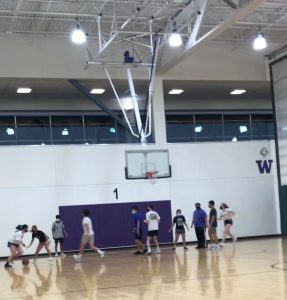10 Coming Back To Sports On Campus
Olivia Song & Ohnshim Kim
The college experience is not only about academics but broader activities regarding networking and physical exercises. There are many changes to how the university operates sportswise due to the pandemic, students often value their campus sports experience enough to want to continue participating in them regardless of the barriers and the interest in campus sports may actually be heightened due to the lengthy time away from it all.
Collegiate Ideal themes are academic life, campus culture, connection & sense of place. The collegiate ideal is where all aspects of campus life both social and academic come together to create the college experience (Toma 81). Although the collegiate ideal is not dependent on sports, the involvement of sports in campus rituals, events and activities make it a valuable element of the collegiate ideal. Coming back to sports on Campus brings a lot of enjoyment and motivation to go to college.
From our interview, we learned that coming back to sports on campus explains the unity, enthusiasm and identity that playing intramural sports and spectator sports bring to college campuses. Playing sports for the school, or watching the school sports teams help students further connect with their campus community and allow students an avenue to pursue extracurricular activities in addition to their academic life. The merging of these two aspects of campus life gives students a well-rounded college experience, strengthens student’s sense of values and success and contributes to the collegiate ideal.
“Covid-19 derailed nearly every aspect of college athletics for the last 15 months but, like many areas of American life, the path to post-Covid life is becoming increasingly clear. ” — Saul 2021

The image shows the first intramural basketball playoff in 2022 since the pandemic. It has taken place at IMA. We can see athletes wearing masks. Pandemic cannot stop the passion of the students and athletes for the sports they love. Moreover, the IMA fee as a mandatory part of UW tuition also encourages students to participate in sports. Doing exercise definitely could become a part of student extracurricular activities and have interaction with people around you. It also provides students with more ways to destress. Preventive measures are updated very frequently. We should take measures that are more flexible and more suitable for us. Our lives are gradually returning to normal just as students are returning to sports on campus.
Quote form class reading:
“The athletic teams, fraternities, and social clubs, theater groups, newspapers, and magazines, all of these various enterprises not only allowed young undergraduates to emulate and prepare for life but also provided them with experiences that they knew to be profoundly human” — Rudolf, 1990
From this reading quote, the importance and significance of extracurricular activities in creating a well-rounded experience contributing to the collegiate ideal can be seen. All the activities listed in the above quote allow students to branch out into their interests outside of academics. This provides them with, as the quote describes it, “profoundly human” experiences that plant their college experience in both social and educational functions. Coming back to sports on campus provides students an outlet for their non-school related interests, but also provides students with life skills they may not otherwise acquire. This encompasses the collegiate ideal of integrating all of these experiences at school, academic and non-academic, into one unified whole.
References
-
Rudolf, F. (1990). The American College and University: A History (Second). University of Georgia Press.
- Saul, Derek. “How College Sports Will Return to Normal.” Forbes, Forbes Magazine, 18 June 2021, https://www.forbes.com/sites/dereksaul/2021/06/18/how-college-sports-will-return-to-normal/?sh=7662e3936b14.
- Toma, J. Douglas. “The Collegiate Ideal and the Tools of External Relations: The Uses of High-Profile Intercollegiate Athletics.” New Directions for Higher Education, vol. 1999, no. 105, 1999, pp. 81–90., https://doi.org/10.1002/he.10507.

